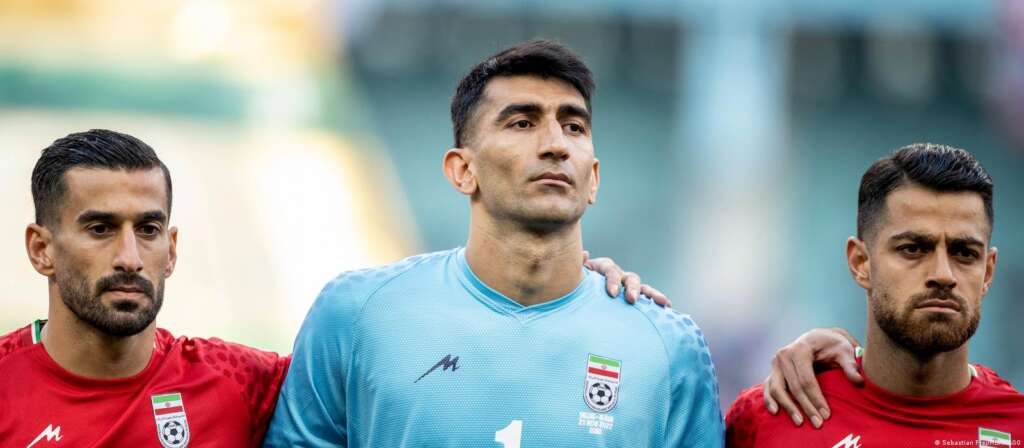Football is the last thing on most people’s minds in Iran at the moment, but the country’s men’s team used the 2022 World Cup in Qatar to launch a powerful protest.
While the national anthem played ahead of their game against England, the team stood silently, refusing to sing. Their decision was met with raucous cheers from the Iran fans, who tried to drown out the anthem with boos for the music and cheers of support for the players. Some applauded with tears in their eyes.
“Everybody knows the circumstances, the environment of my players is not ideal in terms of commitment and concentration, and they are affected by the issue,” a clearly emotional Carlos Queiroz, head of the Iranian team, said afterward. “They are human beings, they are kids.”
“You don’t even know behind the scenes what these kids have been living in the last few days, just because they want to play football,” Queiroz continued.
Before the game, Iran captain Ehsan Hajsafi expressed his condolences to all the bereaved families in Iran, saying: “They should know that we are with them, we support them and we sympathize with them.”

More than a match
Thousands of Iran fans were at the Khalifa International Stadium in Doha and although Iran lost 6-2, it was clear long before kick-off this was much more than another game of international football.
Some fans cheered on their way out of the metro. Some wore t-shirts with the words: “women, life, freedom” written on them. During halftime, an Iranian flag with the same three words was held aloft.
Another fan wore a t-shirt with the message: “75 million. We want change, but not a change that will lead to the destruction of Iran.” One girl, stood with her family, took photos of their tickets and laughed, such was her happiness at having the chance to watch their team play at the World Cup.
Indeed, for many fans attending the game, this was an emotional moment.
“The Iranian regime kills us. I’m here because they killed our children,” Rosita told DW.
“I am here just for Iran, for my country, not the Iranian regime. We hate the Iranian regime. We like Ali Karimi, Ali Daei, we like all people who support Iranian people, not those who don’t support Iranian people.”

‘We are Iranian’
For Fatima, this was a moment of joy and pain.
“I’m so happy but the people in my country are so unhappy. It’s the first time I have experienced the World Cup, and I am very happy to be here. In Iran, women are not allowed to go to the stadium,” Fatima said. “This is the first time my brother and I go to the stadium.”
In August this year, for the first time in over four decades, Iranian authorities allowed female football fans to attend a men’s league match.
“All Iranian people I think have their hearts with the people in Iran. We are Iranian, all of us,” Behman said before the game.
Some fans didn’t want to talk or wanted the conversation to be about football.
“We are gathering here as football fans to enjoy the game and not to talk about what’s happening in Iran,” said Abdallah.

Months of unrest
Ever since the death of 22-year-old Jina Mahsa Amini in September, protests against the government across the country have spread. At Amini’s funeral, the words “women, life, freedom” were first sung. They became a rallying cry across Iran as civil unrest unfolded. Hundreds of protesters are reported to have been killed and thousands more detained.
Before the World Cup began, Iran’s record goal scorer and former Bayern Munich striker Ali Daei refused an invitation to attend the tournament in a show of solidarity with Iranian protesters. During the Iran game, there were chants of support for Daei and Karimi.
In September, star player and Bayer Leverkusen forward Sardar Azmoun posted on Instagram saying: “My heart breaks for Mahsa Amini… I will always support you… I hope that one day your place in this country will be justified and I hope that the women of my country will never suffer the same.”
Many thought he might not even make the World Cup squad when, after having blacked out his Instagram profile picture in support of the protests, Azmoun posted more support on Instagram stories, saying: “That is worth sacrificing for one strand of Iranian women’s hair. Shame on you who kill people so easily. Long live Iranian women.”
But Azmoun is there in Qatar and although he didn’t start against England he did come off the bench. When he took to the field, he was met with a huge cheer from the crowd — the same was not true for Mehdi Torabi when he came on.
From the protest during the anthem to the visible emotion in the stands and Queiroz’s words late on, this was a historic day for Iranian football. Two goals were cheered late on, but for many here it was clear the desired victory lies beyond the football fields of Qatar.



